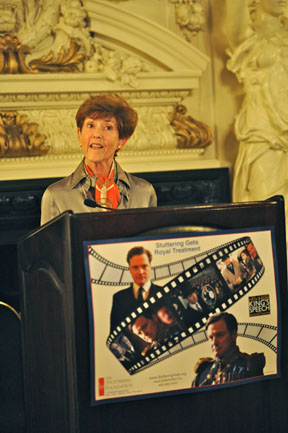Help For Stuttering
If you stutter, who can help you?
Lewis Carrol suffered from stuttering
 The recent Disney version of Lewis Carroll's classic, Alice in Wonderland, garnered a great deal of media hype. Even though the mainstream media has not made mention that Carroll was a person who stuttered, his family history gives credence to the discovery of the genetic link to stuttering.
The recent Disney version of Lewis Carroll's classic, Alice in Wonderland, garnered a great deal of media hype. Even though the mainstream media has not made mention that Carroll was a person who stuttered, his family history gives credence to the discovery of the genetic link to stuttering.
Library Resources - Link to PDF
Library Resources
SFA publications are provided free of any charges to public libraries.
If your local library doesn't have our newest materials, please give them a library request card. Click here to download it.
See what one Indiana library is doing to help those who stutter.
2010 FAME Essay Winner
My Disability Lesson
By Andrew Feese
2010 FAME Essay Winner
This is a new age for people who are disabled. There are electronic aides, there are therapists, and there are exceptions.
Palm Desert Golf Benefit
Palm Desert Golf Event Benefits
Memphis-Based Stuttering Foundation
Golfers gathered April 22-24 to play with golf greats Al Geiberger (Mr. 59) and special honoree Ken Venturi, former U.S. Open Champion and CBS commentator for 35 years.
The Mr. 59 Invitational is held each year to commemorate the extremely low score of 59 shot by Al Geiberge "the first 59 shot in an official PGA Tour event" at the 1977 Danny Thomas-Memphis Classic in Memphis.
FAQ's for Parents
What should I do when my child stutters?
The most important thing to do when someone is stuttering is be a good communicator yourself.
What makes you stutter?
Everyone is different. Your best friend may be better at math than you are. And maybe you're better than he is at art. Maybe another one of your friends is good at sports and can run really fast. Everyone is good at different things.
About Us

Stuttering. This often misunderstood disability affects over three million Americans. And despite decades of research, both basic and clinical, the causes are still largely unknown.
Brain Development in Children Who Stutter
by Soo-Eun Chang, Ph.D. (Winter 2011)
Feedforward Strategy In Children
by Rick Arenas, M.A. (Fall 2010)
Genetic Causes
MEMPHIS, Tenn. ' The mystery behind a complex disorder called stuttering became a little clearer today with the announcement of the discovery of three genes for stuttering by Dennis Drayna, Ph.D., a director of the Stuttering Foundation and researcher for the National Institute on Deafness and Other Communication Disorders.
NIC discovers new stuttering genes
Stuttering may be the result of a glitch in the day-to-day process by which cellular components in key regions of the brain are broken down and recycled, says a study in the Feb. 10 Online First issue of the New England Journal of Medicine. The study, led by researchers at the National Institute on Deafness and Other Communication Disorders (NIDCD), part of the National Institutes of Health, has identified three genes as a source of stuttering in volunteers in Pakistan, the United States, and England. Mutations in two of the genes have already been implicated in other rare metabolic disorders also involved in cell recycling, while mutations in a third, closely related, gene have now been shown to be associated for the first time with a disorder in humans.
Neurobiology of Stuttering: Are There Distinct Subtypes?
By Anne L. Foundas, M.D. (Winter 2010)
Childhood Stuttering
by Hayley S. Arnold, Ph.D., Purdue University (Fall 2009)
Introduction to Cognitive Therapy
by Jane Fry, MSc (Psych Couns)., Dip CT (Oxon), Michael Palin Centre (Fall 2009)
ADHD and Stuttering
Attention-Deficit/Hyperactivity Disorder (ADHD) is a neurodevelopmental disorder characterized by three primary symptoms: short and inconsistent attention span, impulsive behavior, and hyperactivity. ADHD affects approximately 3%-7% of children in the United States with a male/female ratio of about 2 to 1.
The Impact of ADHD on Stuttering Therapy
by Joseph Donaher, Ph.D. (Summer 2009)
Research on Electronic Devices: Preliminary Results
by Anne L. Foundas, M.D., and Edward G. Conture, Ph.D. (Summer 2009)
Clinical Trials and Cognitive Therapy
by Susan Block, Ph.D. (Winter 2009)
Autism Spectrum Disorders
Autism Spectrum Disorders (ASDs) include Autism, Pervasive Developmental Disorder Not Otherwise Specified, and Asperger's Syndrome. All three are characterized by impairments in 1) social interaction, 2) communication, and 3) restricted interests/repetitive behaviors. Specific criteria distinguish one subgroup from another. ASDs are often first diagnosed in childhood, and intelligence ranges from below to above average. There is no definitive research regarding the cause of ASDs.
New Look at Stuttering and Emotions
by Edward G. Conture, Ph.D. (Fall 2008)
New Research from Purdue
by Anne Smith, Ph.D. (Summer 2008)
Temperament Can Underlie "Signature Strengths" in Children Who Stutter
by Patricia M. Zebrowski, Ph.D. (Summer 2008)






 Podcast
Podcast Sign Up
Sign Up Virtual Learning
Virtual Learning Online CEUs
Online CEUs Streaming Video Library
Streaming Video Library